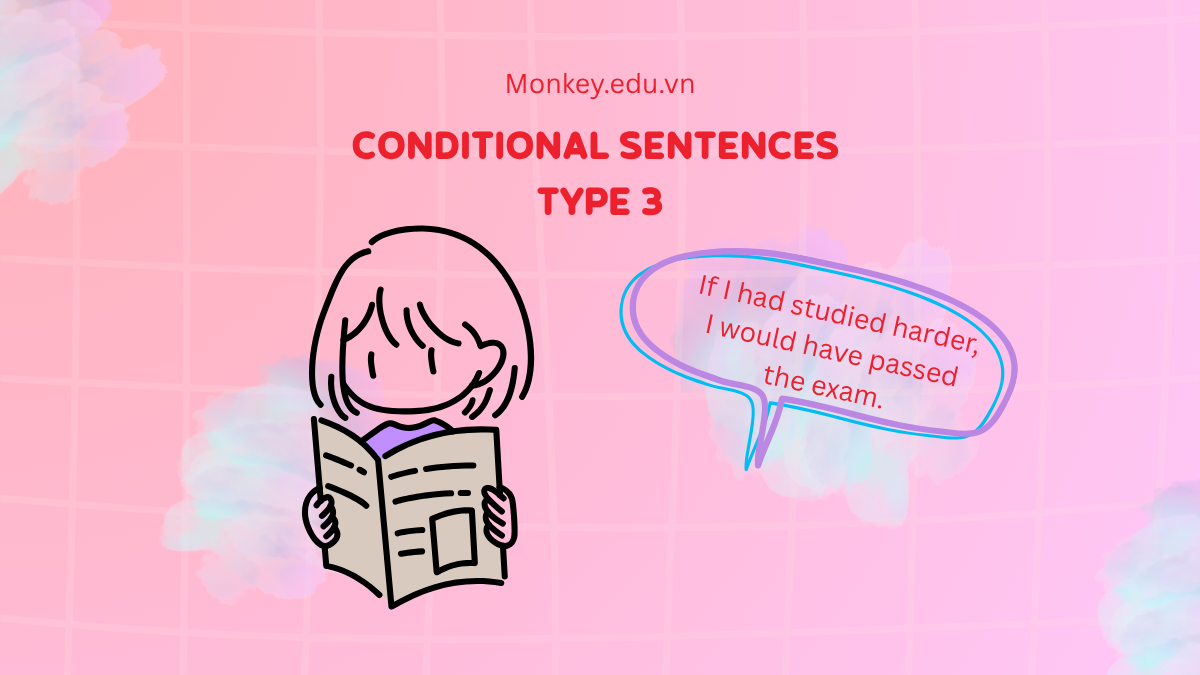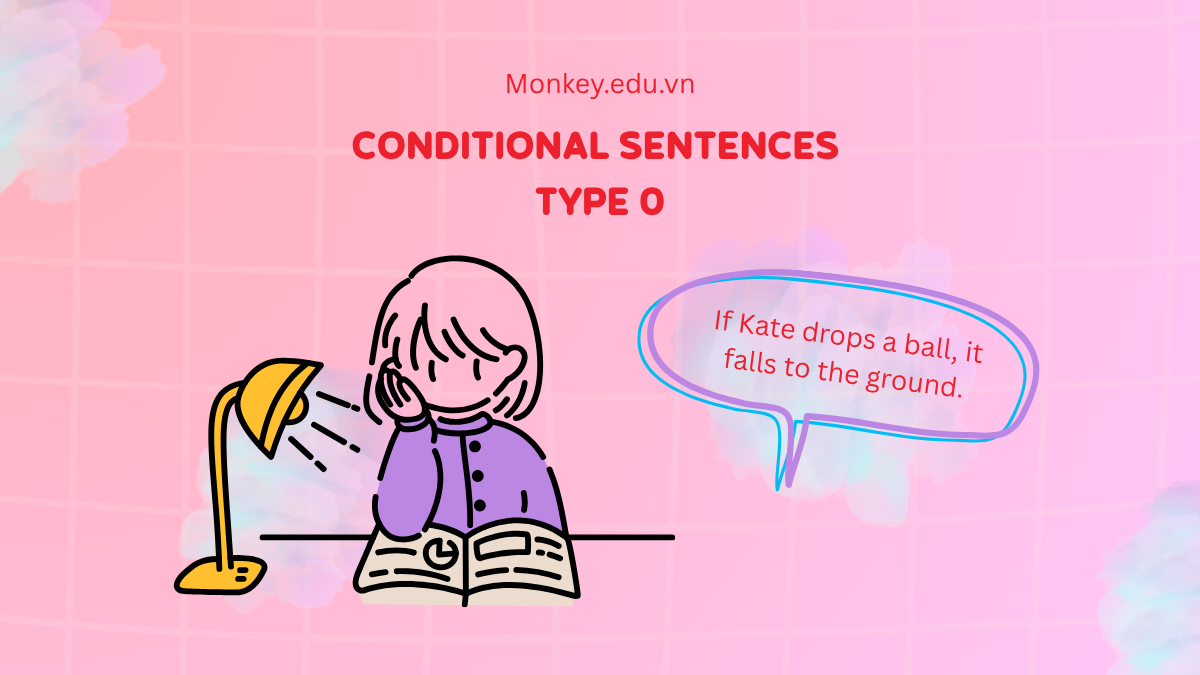Are you considering studying, working, or migrating to an English-speaking country? If so, you've likely come across the IELTS (International English Language Testing System) exam. But what is IELTS exactly, and why is it so crucial for your global aspirations? This comprehensive guide will break down everything you need to know about this widely recognized English proficiency test, from its different types and intricate structure to effective preparation strategies that can help you achieve your desired score.
What is IELTS?
IELTS, short for the International English Language Testing System, is a globally recognized English proficiency test designed to assess the four essential language skills: Listening, Reading, Writing, and Speaking. Accepted by over 11.000 institutions worldwide, IELTS is widely used for study, work, and immigration purposes, especially in countries like the UK, USA, Australia, Canada, and New Zealand.
Why should you take the IELTS test?
You should take the IELTS test for several key reasons, primarily if you have aspirations related to international education, global employment, or immigration. Here's a breakdown of why it's so important:
-
Required for studying abroad: Most universities in English-speaking countries like the UK, USA, Australia, and Canada require IELTS scores as part of their admissions process.
-
Boosts global career opportunities: Over 11.000 employers and institutions worldwide recognize IELTS as a reliable proof of English proficiency.
-
Supports immigration applications: IELTS is often mandatory for visa and immigration processes in countries such as the UK, Canada, Australia, and New Zealand.
-
Improves academic readiness: Preparing for IELTS helps strengthen all four essential English skills - Listening, Reading, Writing, and Speaking - ensuring you're ready for academic success.
-
Enhances job prospects and salary potential: A strong IELTS score can give you a competitive edge in the job market and open doors to higher-paying positions.
-
Personal development: Even if you're not planning to study or work abroad, taking IELTS is a great way to assess and improve your English skills in a structured way.

Types of IELTS certificates
When discussing "types of IELTS certificates", it's more accurate to talk about the different types of IELTS tests you can take, as the certificate you receive reflects the specific test version. While the certificate itself generally looks similar, the "type" indicated on it signifies the module you completed and its intended purpose.
Here's a breakdown of the main types of IELTS tests and the certificates they lead to:
IELTS Academic
IELTS Academic is ideal for students who want to study at the undergraduate or postgraduate level in English-speaking environments. In Thailand, many leading universities such as Chulalongkorn University, Mahidol University, and Thammasat University accept IELTS Academic scores for admission into both Thai and international programs.
The test covers all four English language skills: Listening, Reading, Writing, and Speaking; to assess academic readiness. For Thai students aiming to study abroad or apply for English-taught programs locally, IELTS Academic is a trusted and widely accepted certification.
IELTS General Training
IELTS General Training is designed for those planning to work, train, or migrate to English-speaking countries. It tests all four language skills: Listening, Reading, Writing, and Speaking; but the Reading and Writing sections are less academically complex compared to IELTS Academic.
This version of the IELTS is ideal for Thai candidates applying for vocational training, secondary education, or immigration purposes. It is accepted by various government bodies and employers in countries like the UK, Australia, New Zealand, and Canada.
IELTS Regular
IELTS Regular refers to the standard format of the IELTS test, available in both Academic and General Training versions. It is widely accepted in countries like Australia, New Zealand, and many European nations for study, work, or migration purposes.
For Thai candidates, IELTS Regular is the most commonly taken format for both local and international applications. Whether you're applying to a university or planning to move abroad, this test provides globally recognized English certification.
IELTS UKVI
IELTS UKVI is an approved English language test recognized by the UK government for visa and immigration purposes. It is available in both Academic and General Training formats and is required when applying for a UK visa under specific categories.
For Thai students planning to study in the UK, IELTS UKVI is also accepted for Pre-sessional English courses and university admissions. In addition to visa applications, it can be used similarly to the Regular IELTS test for general study or work purposes.
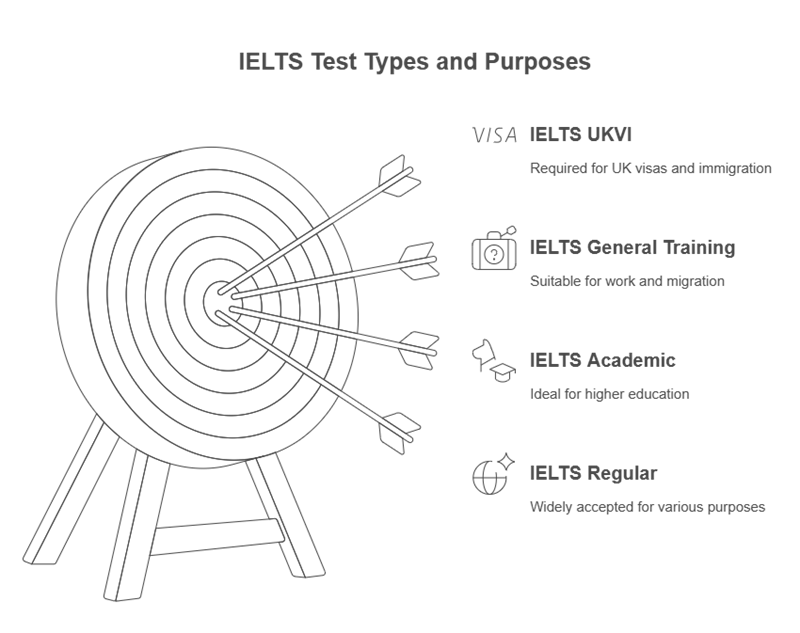
IELTS test structure
The IELTS (International English Language Testing System) exam has a standardized structure designed to assess a candidate's English language proficiency across four key skills: Listening, Reading, Writing, and Speaking.
While there are two main types of IELTS (Academic and General Training), the Listening and Speaking sections are identical for both. The Reading and Writing sections differ based on the test type.
Here's a detailed breakdown of the IELTS test structure:
Total Test Duration: Approximately 2 hours and 45 minutes.
The Listening, Reading, and Writing tests are completed on the same day with no breaks in between. The Speaking test can be on the same day or up to 7 days before/after.
Listening (Approx. 30 minutes + 10 minutes transfer time for paper-based test)
-
Format: 4 parts, 40 questions in total. You hear each recording only ONCE.
-
Recordings:
-
Part 1: A conversation between two people in an everyday social context (e.g., booking a hotel room, asking about travel arrangements).
-
Part 2: A monologue set in an everyday social context (e.g., a speech about local facilities, a radio broadcast).
-
Part 3: A conversation between up to four people in an academic or training context (e.g., students discussing a project, a tutor and students talking about an assignment).
-
Part 4: A monologue on an academic subject (e.g., a university lecture).
-
Question Types: Multiple choice, matching, plan/map/diagram labelling, form/note/table/flow-chart/summary completion, sentence completion, short-answer questions.
-
Key Skill Tested: Ability to understand main ideas, specific factual information, opinions, attitudes, purpose of the speakers, and follow the development of an argument.
Reading (60 minutes)
-
Format: 3 sections, 40 questions in total.
-
Content Varies by Test Type:
-
IELTS Academic Reading:
-
Texts: Three long, authentic texts taken from books, journals, magazines, and newspapers. They are often descriptive, factual, discursive, or analytical. These are suitable for non-specialist audiences but are appropriate for people entering university courses or seeking professional registration.
-
Question Types: Multiple choice, identifying information (True/False/Not Given), identifying writer's views/claims (Yes/No/Not Given), matching information, matching headings, matching features, matching sentence endings, sentence completion, summary completion, note completion, table completion, flow-chart completion, diagram label completion, short-answer questions.
-
IELTS General Training Reading:
-
Texts: Three sections with texts taken from notices, advertisements, company handbooks, newspapers, instruction manuals, and books. These materials are encountered in everyday life in an English-speaking country. Section 1 often has several short, factual texts. Section 2 has two short, work-related factual texts. Section 3 has one longer, more complex text on a general topic.
-
Question Types: Similar to Academic Reading, but adapted for the different text types.
-
Key Skills Tested: Reading for gist, main ideas, and detail; understanding inferences and implied meaning; recognizing writer's opinions, attitudes, and purpose; following the development of an argument.
Writing (60 minutes)
-
Format: 2 tasks. You should allocate approximately 20 minutes for Task 1 and 40 minutes for Task 2.
-
Content Varies by Test Type:
-
IELTS Academic Writing:
-
Task 1 (minimum 150 words): You are presented with a graph, table, chart, or diagram and asked to describe, summarize, or explain the information in your own words. This might involve describing and explaining data, describing the stages of a process, how something works, or describing an object or event.
-
Task 2 (minimum 250 words): You are asked to write an essay in response to a point of view, argument, or problem. Your response should be in a formal style.
-
IELTS General Training Writing:
-
Task 1 (minimum 150 words): You are presented with a situation and asked to write a letter requesting information or explaining the situation. The letter can be personal, semi-formal, or formal depending on the context.
-
Task 2 (minimum 250 words): You are asked to write an essay in response to a point of view, argument, or problem. Your response can be in a more personal or semi-formal style, but still coherent and well-structured.
-
Key Skills Tested: Ability to present a solution to a problem; present and justify an opinion; compare and contrast evidence, opinions, and implications; evaluate and challenge ideas, evidence, or arguments; organize, present, and compare data; describe processes or objects; and write coherent and grammatically accurate texts.
Speaking (11-14 minutes)
-
Format: A face-to-face interview with a certified examiner. The test is recorded.
-
Parts: 3 parts.
-
Part 1: Introduction and Interview (4-5 minutes): The examiner introduces themselves and asks you to introduce yourself and confirm your identity. They then ask general questions on familiar topics such as your home, family, work/studies, hobbies, and interests. This part is designed to help you relax and speak naturally.
-
Part 2: Long Turn (3-4 minutes, including 1 minute preparation time): The examiner gives you a cue card (task card) with a topic to talk about. You have 1 minute to prepare and make notes, then you speak for 1 to 2 minutes on the topic. The examiner may ask one or two rounding-off questions at the end.
-
Part 3: Discussion (4-5 minutes): The examiner asks further, more abstract questions related to the topic from Part 2. This part allows for a more in-depth discussion of issues and ideas.
-
Key Skills Tested: Fluency and coherence, lexical resource (vocabulary), grammatical range and accuracy, and pronunciation. The examiner assesses your ability to communicate opinions and information, speak at length, organize ideas coherently, express and justify opinions, and analyze, discuss, and speculate about issues.
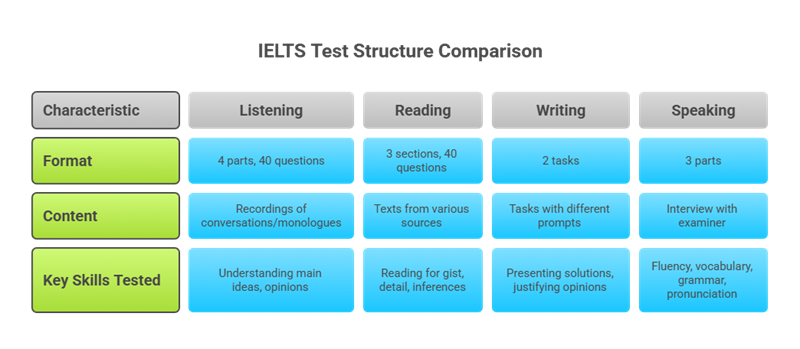
IELTS Band score system
The IELTS Band Score System is a 9-band scale used to report test results consistently and accurately. There is no "pass" or "fail" in IELTS; instead, you receive a score from Band 1 (Non-user) to Band 9 (Expert user).
|
Here's a detailed explanation of the IELTS Band Score System: You receive a separate band score for each of the four skills tested: Listening, Reading, Writing, Speaking. These individual scores can be whole bands (e.g., 6.0, 7.0) or half bands (e.g., 6.5, 7.5). Your Overall Band Score is calculated by taking the average of your four individual skill scores. This average is then rounded to the nearest whole or half band. Rounding rules for overall band score:
Example calculation:
Total: 7.0 + 6.5 + 6.0 + 7.0 = 26.5 Average: 26.5 / 4 = 6.625 Overall Band Score (rounded): 6.5 |
Each band score corresponds to a clear descriptor of English language proficiency:
|
Band Score |
User Type Described |
Detailed Description of Proficiency |
|
9 |
Expert User |
Has fully operational command of the language: appropriate, accurate, and fluent with complete understanding. |
|
8 |
Very Good User |
Has fully operational command of the language with only occasional unsystematic inaccuracies and inappropriacies. Misunderstandings may occur in unfamiliar situations. Handles complex detailed argumentation well. |
|
7 |
Good User |
Has operational command of the language, though with occasional inaccuracies, inappropriacies, and misunderstandings in some situations. Generally handles complex language well and understands detailed reasoning. |
|
6 |
Competent User |
Has generally effective command of the language despite some inaccuracies, inappropriacies, and misunderstandings. Can use and understand fairly complex language, particularly in familiar situations. |
|
5 |
Modest User |
Has partial command of the language, coping with overall meaning in most situations, though is likely to make many mistakes. Should be able to handle basic communication in own field. |
|
4 |
Limited User |
Basic competence is limited to familiar situations. Has frequent problems in understanding and expression. Is not able to use complex language. |
|
3 |
Extremely Limited User |
Conveys and understands only general meaning in very familiar situations. Frequent breakdowns in communication occur. |
|
2 |
Intermittent User |
No real communication is possible except for the most basic information using isolated words or short formulae in familiar situations and to meet immediate needs. Has great difficulty understanding spoken and written English. |
|
1 |
Non User |
Essentially has no ability to use the language beyond possibly a few isolated words. |
|
0 |
Did Not Attempt the Test |
Did not answer the questions. |
IELTS test fees and registration guide
IELTS test fees in Thailand depend on the test format and provider. For IELTS Academic or General Training, the fee is usually 7,100 THB at the British Council and 7,500 THB at IDP. For IELTS UKVI, the fee is approximately 7,710 THB, while IELTS Life Skills costs around 5,800 THB. These fees may change annually, so it’s important to check the latest rates on the official websites before registering.
There are two official IELTS test providers in Thailand: IDP Thailand (from Australia) and British Council Thailand (from the UK). Both offer computer-based and paper-based IELTS tests in major provinces including Bangkok, Chiang Mai, Khon Kaen, Hat Yai, Korat, Phitsanulok, and Phuket. You can register directly through their websites or via authorized language centers such as Englishparks, which is also an official IDP test venue.
Test format options:
-
Paper-based IELTS: Test results are available after 13 days. Suitable for candidates who prefer writing by hand or like taking notes during the test.
-
Computer-based IELTS: Results come out faster, within 5-7 days. Best for those who type quickly and want faster processing times.
If you need your results urgently, choose a computer-based test in Bangkok, where test slots are more frequent and results are released faster.
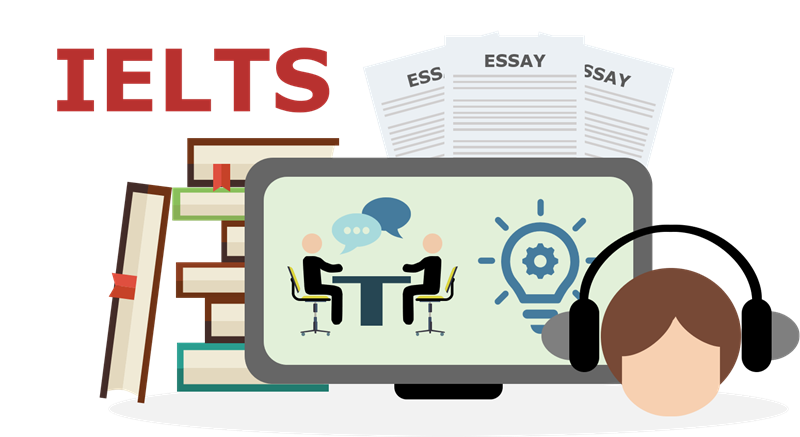
How to prepare for the IELTS exam effectively
To succeed in the IELTS exam, proper preparation is key. First, you need to understand the test format, including the four components: Listening, Reading, Writing, and Speaking. Familiarizing yourself with the structure and timing of each part helps reduce exam-day stress and boosts performance.
Use reliable IELTS preparation materials such as textbooks, practice tests, and online resources. Set a consistent study schedule to practice all four skills daily. Joining an IELTS course or study group can provide extra motivation and guidance.
Practicing with mock tests is essential. These help you become familiar with question types, improve time management, and identify your weaknesses. The more you simulate real test conditions, the more confident you’ll feel.
Start your English learning journey early with foundational tools like Monkey Junior. It’s a fun and interactive way to build vocabulary, pronunciation, and grammar skills - all crucial for IELTS success, especially if you're starting from a beginner level.
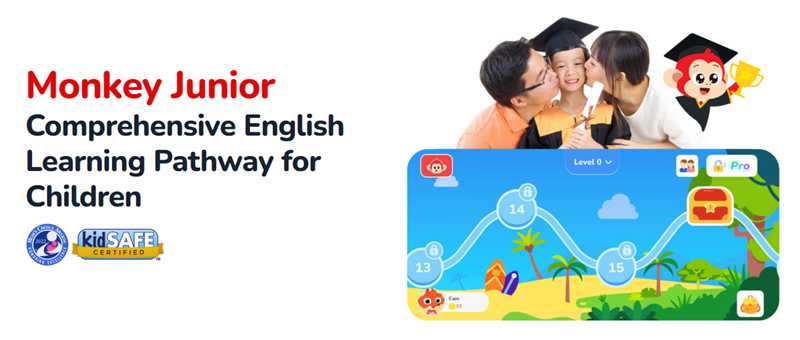
Frequently asked questions about IELTS
1. What is the IELTS test used for?
The IELTS test is an English language proficiency test used for study, work, and migration purposes. It is recognized by over 12.500 organizations, including educational institutions, employers, professional associations, and governments, in 150 countries.
2. How many skills are tested in the IELTS exam?
There are four skills tested: Listening, Reading, Writing, and Speaking.
3. Are all skills taken on the same day?
Listening, Reading, and Writing are all taken on the same day, with no break between them. The Speaking test can be taken either before, after, or on the same day as the other skills, depending on the test center.
4. How do I register for the IELTS test?
Registration is typically done online through the official websites of test providers like British Council or IDP Education. You will need a valid identification document (usually a passport) to complete your registration.
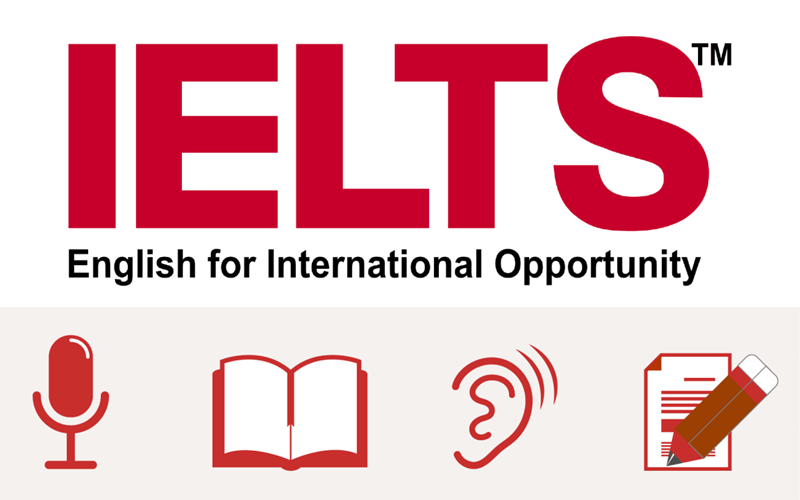
Understanding what is IELTS and familiarizing yourself with its format, scoring, and requirements is the first critical step toward success. Whether you're aiming for academic pursuits or professional opportunities abroad, diligent preparation and a strategic approach are key. By applying the insights and tips shared in this guide, you'll be well-equipped to tackle the IELTS exam with confidence and unlock your potential in the global arena.




.png)



